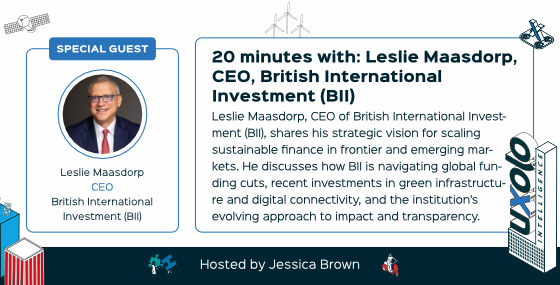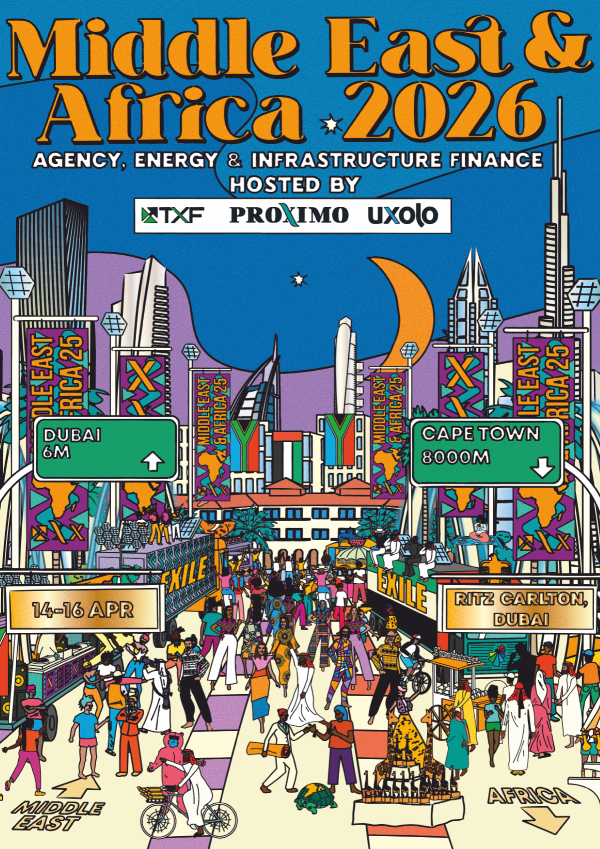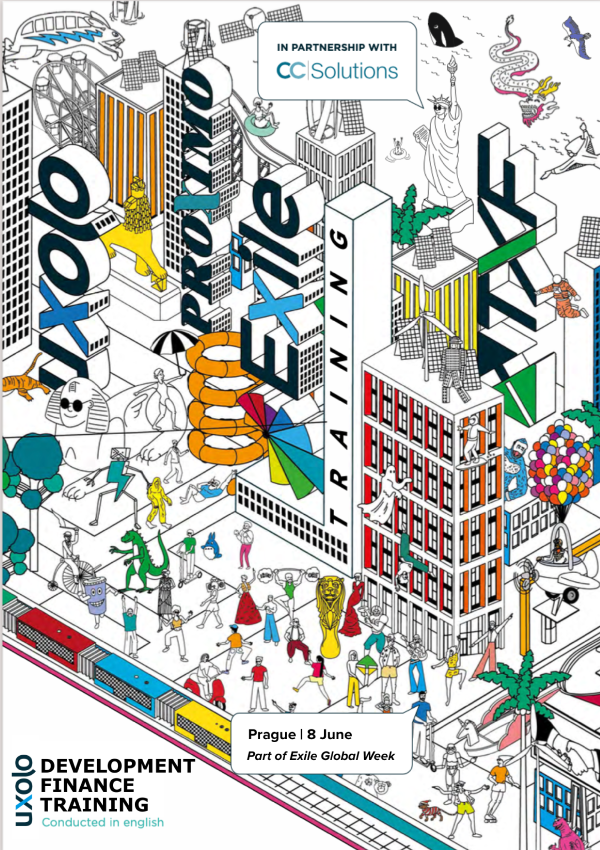Changing direction
After four year's of Trump's America First policies, what will be Biden’s approach to development finance? Uxolo caught up with David Baxter, a 25-year international development veteran based in Washington DC, to find out how development finance will likely fit into the Biden administration’s agenda.

In January, the US welcomed its 46th President and 117th Congress, with early expectations indicating that at both ends of Pennsylvania Avenue there will be policymakers with a strong commitment to the central role of diplomacy and development in advancing US interests abroad. But they’ll have their work cut out for them. The COVID-19 pandemic has wiped out decades of gains in international development and for the first time since 1998, there will be a rise in global poverty that will push as many as 150 million people into extreme poverty by the year’s end.
Uxolo caught up with international-development expert David Baxter to find out how development finance will fit into the Biden administration’s policy agenda. Baxter currently serves on the Steering Committee of the World Association of PPP Units and Professionals (WAPPP) and as a senior vice-president to the International Sustainable Resilience Center (ISRC).
Uxolo: What will be the Biden administration’s general approach to international development and development finance?
David Baxter: The big thing is that it seems the Biden administration is going to move away from the ‘America First’ policy of the previous administration. There are very strong commitments to finding ways to work collaboratively with allies and aligned institutions that are focused on international development; not going it on their own but collaborating and leveraging the different resources of different development institutions. Whether it’s DFID, The World Bank, the Asian Development Bank, and so on, the aim will be to synchronise efforts rather than going off in the opposite direction.
There’s going to be a big focus on climate change elements. They talk about resilience and sustainability; that’s not just climate change and philanthropy but it’s about serious financial arrangements—through things like public-private partnerships (PPPs) or specific initiatives launched by the new development bank, the US International Development Finance Corporation (DFC), to create projects that are going to be sustainable.
The big question obviously is what they do about China. The new administration has not 100% reversed its predecessor’s approach to China, because whether the President is Republican or Democrat there’s widespread concern about the influence of China and the way it does business. What I see thus far from the Biden administration is that they will definitely be working at supporting projects that will counterbalance the rawer side of the Chinese process but will also re-introduce the US as a global competitor.
They will definitely look to tie foreign policy in with domestic policy, and that means finding ways to tie what’s good for American labour and industrial policy to what’s good for other countries—i.e. the reverse of the ‘America First’ approach, where only the American side mattered. It’ll be about how they find ways to work on intellectual property, to work on labour issues, on competitiveness, and bridge all that over to international policy.
There has been talk of the so-called ‘Biden Doctrine’, which is about having international development work for the American middle class. I’m not sure anyone really knows what that means yet but I think it’s something to do with bringing prosperity to all stakeholders involved rather than just to a few.
Development finance will play an important role in the administration’s development agenda. I don’t think it will be as ideological as it was under Trump. I think it’s going to be based on pragmatism and projects that actually are going to make changes.
Uxolo: Which US agencies will be tasked with leading that agenda?
David Baxter: There are a lot of US agencies out there, but the primary leaders will be USAID, the Millenium Challenge Corporation (MCC), the Department of State, the Department of Agriculture, and the DFC. I think the differences will be that where USAID is going to be about capacity building and technical advisory services etc, the MCC signs these five-year compacts with countries where they give grants for specific programmes, which are used as seed money to make projects less risky and more bankable so that they draw in investors.
The other big initiative is the Power Africa programme, and it’s Asia-focused spin-off, where the Department of Commerce, The Department of State, USAID, and seven other partners work together to provide advice, financing, support, grants, etc, to help countries that need to develop sustainable renewable energy resources and move away from their over-reliance on massive power grids toward mini, small or off-grid power supplies.
Uxolo: The DFC was launched in late 2020 with the express intent of better linking US aid and development to the country’s domestic commercial interests. How nationalist an agenda will the DFC have under Biden? And will it look to play more of an Eximbank role in order to take on the Chinese development banks and export credit agencies at their own game?
David Baxter:If you look at the terms and conditions that are being sent out for American goods and expertise for projects, I don’t think they’re nearly as stringent as for the Chinese banks or, say, India Eximbank. They talk about transparency and competitive bidding for projects, tenders and loans, but I’ve been impressed by the low bar that they've set for American involvement in American-financed projects.
I think one thing that they also want to focus on—and I’m working with USAID on this—is how you cut the transactional costs of foreign investment and financing so that the countries get a really good benefit out of it, rather than it just enrichening certain groups or banks making enormous profits.
Biden last week said that they are going to work in a way that is beneficial to all parties, and I suppose that would definitely underline how the DFC will likely move forward. But the DFC was pretty flexible and liberal when it came to those things anyway.
I think the DFC and US EXIM Bank will probably be holding hands a lot more moving forward. It doesn’t really make sense for them to have divergent policies. But, obviously, US EXIM Bank is still going to be focused on promoting American goods and services. When I was working on projects for MCC, there was a great concern about how many of these big infrastructure projects were being pursued by Chinese state-owned companies (SOEs), and that there wasn’t a level playing field. And there were moves at the time to exclude SOEs from all countries from any US foreign aid and investment.
But ultimately, the big problem is whether the US can come up with a consistent practice and policy that doesn’t change every time there’s a change in administration.
Uxolo: What specific regions and sectors will be particularly targeted for support?
David Baxter: I think based on Biden’s conversation last week with the African Union, Africa is going to be a very big focus. I know the countries around the South China Sea, and generally South East Asia, are going to get a lot of support—not specifically for geopolitical reasons but rather just for stability reasons. It’ll be interesting to see what happens in Myanmar.
As for sectors, renewable energy will certainly be a big one, but the one that keeps on constantly cropping up in conversation is digital infrastructure. And the reason is that digital infrastructure enables people to carry out all kinds of commerce, business and socialisation, etc, which they can’t do in the rapidly globalising world if they don’t have access to broadband. Also digital infrastructure is a great conduit for the education and democratisation of communities and societies.
The most challenging sector—but also perhaps the most promising one—is transportation, especially when it comes to smart technologies. The investment opportunities that I think are going to be most popular in emerging economies are definitely the smart technologies and digital infrastructure, because they also help countries to leapfrog the technology gap—you can roll out 5G now and you don’t need to have gone through 40 years of the previous iterations of the infrastructure.
An area that is of concern is the problem of technological obsolescence. You can spend a lot of money up front for something now but in two or three years time it’s obsolete. So what will be the appetite for investors in the short, medium and long term? I can see pension funds being interesting in the long term, such as 20-year PPPs with guaranteed 5% rates of return, but very competitive investors looking to maximise profits want quick returns, they want 15% returns, and certainly there is going to be a big challenge there achieving those in the current environment.
Uxolo: How supportive will the Biden administration be to the multinational finance institutions the US is a member of?
David Baxter:When Trump brought in the last head of the World Bank, he wasn’t a very popular figure internally because he was blocking a lot of things from happening because they didn’t jive with the Trump agenda. From what I’m hearing about the Biden administration is that there is a great appreciation for institutions like the World Bank and the Inter-American Development Bank. And if the US is saying it’s going to reach out to its allies and institutions that are aligned with a stable global economy, then those kinds of institutions are going to be really important.
Also, to counter the China-led Asian Infrastructure Investment Bank (AIIB), the Asian Development Bank (ADB) will be given more support to make sure that it doesn’t lose any of its impact and power in the region.





